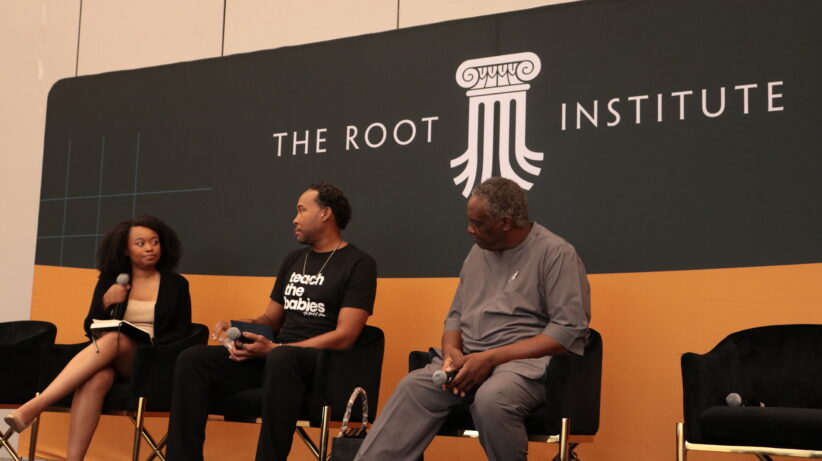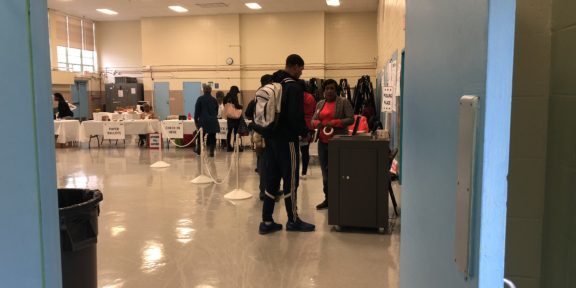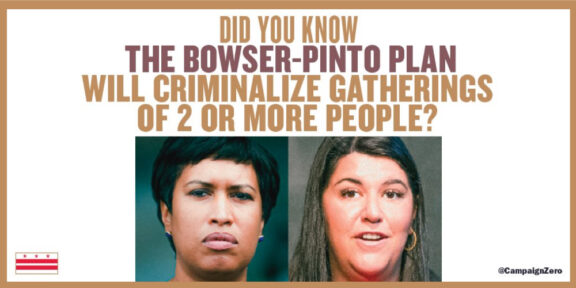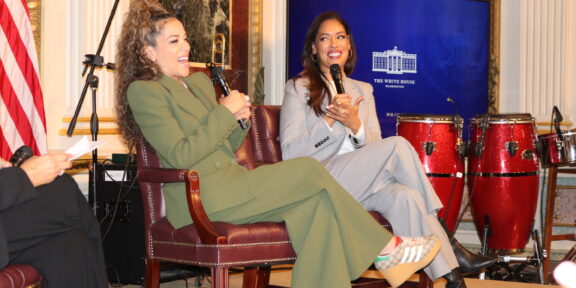Notable Black experts from politics to entertainment to tech shared their advice to create a “Blueprint for a Better Black America” during The Root Institute on Wednesday at Howard University’s Armour J. Blackburn University Center in Washington, D.C. TheRoot.com partnered with Amazon to host its annual symposium, which offered a full day of master classes featuring “some of the greatest minds in the country,” said Tatsha Robertson, editor-in-chief of the digital magazine. Find recaps of a few panels below.
‘We Can Position Ourselves as the Solution,’ a Panelist Shares on the Future of Artificial Intelligence
By Makenna Underwood
Among the highlights of the day-long conference was a discussion on “AI and the Future of Black America,” featuring panelists Jamila Smith-Loud, Gbolahan Olanubi and Mutale Nkonde.
In a 30-minute discussion moderated by Ingrid Sturgis, chair of the Department of Media, Journalism and Film at Howard, the panelists addressed concerns about AI’s effect on civilization, the intersection of technology and racial bias, and efforts they’re making to hold intentional conversations about AI with Black citizens.
“We’re in the midst of technological change where things are happening within our society with technology that are new and novel,” said Smith-Loud, a research manager of Responsible AI at Google. “As a Black woman, as a parent [and] as a mother, I think it’s really important that our community is involved. It doesn’t feel like this is ‘The Terminator,’ but there are ways AI is being used and it’s concerning.”
Although many citizens fear AI may have dangerous implications with the rise of AI services like Chat GPT, which crossed 100 million users in the first nine months of its use, Olanubi says artificial intelligence can still be used to advance Black voices.
Olanubi, a senior UX researcher at Google, collaborates with Howard on Project Elevate Black Voices, which focuses on enhancing speech technology. “Companies can reach out to Howard University for access to data for voice models” and better improve their voice recognition, Olanubi said.
For him, it means that African-American voices can use Siri and other voice recognition services without needing to repeat themselves multiple times.
Nkonde, founding CEO of AI for The People, echoed the sentiments of Olanubi but emphasized the importance of ensuring that new technologies do not come at the expense of marginalized communities.
“Sometimes these tools can be racist, sexist, ableist,” Nkonde said. “But being aware we have the power of agency over these technologies and we can make them better and we can get high-paying jobs. … I think it is a very powerful way of thinking about some of the problems that they have. We can position ourselves as the solution.”
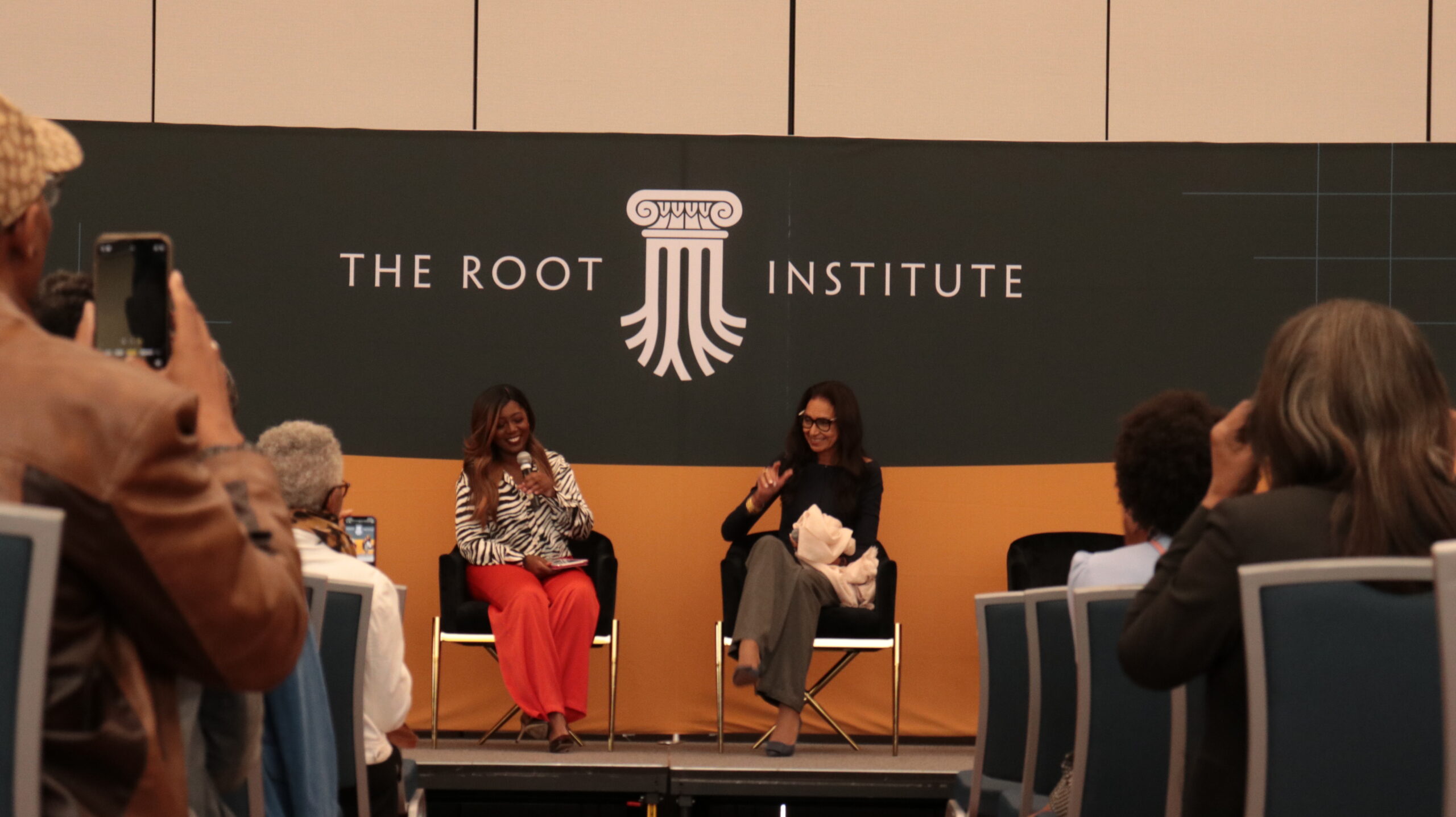
Inside Hollywood’s Backstory With Producer and Writer Susan Fales-Hill
By Ebenezer Nkunda
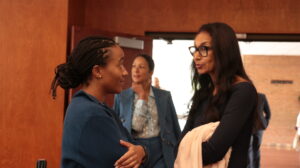
Susan Fales-Hill, executive producer and writer of “And Just Like That,” a Max spin-off of “Sex and the City,” discussed navigating Hollywood as a Black creative during a conversation with Shenelle Genai, entertainment reporter for TheRoot.com, on “Inside Hollywood’s Backstory.”
The renowned screenwriter and author’s career began when she served as an apprentice on “The Cosby Show.” Over time, she rose to co-executive producer and head writer on the spin-off series “A Different World,” becoming one of the only female and youngest showrunners in Hollywood during the era.
She described working in Hollywood as a “non-linear, but not impossible” journey. Upon returning to the industry after an extended hiatus, she was initially perceived as a “has-been,” describing herself as a “Jheri curl that no one wanted.”
Fales-Hill highlighted the power of television not only to entertain, but also to enlighten audiences about their common humanity. In an industry that has often marginalized and misrepresented Black characters, she stressed the significance of portraying educated, accomplished and multi-faceted Black individuals who are deserving of nuanced storytelling.
One example that she cited was her collaboration with Lena Waithe, who created BET’s popular comedy series “Twenties.” Despite generational differences, the two successfully told stories of Black queer women.
Like many Black writers, Fales-Hill feels a profound sense of responsibility when crafting narratives, constantly evaluating whether they are authentic. She acknowledged that this responsibility is further fueled by the memory of past generations of Black artists who were denied opportunities to achieve their dreams. As a result, she remains committed to developing complex narratives that capture the Black experience.
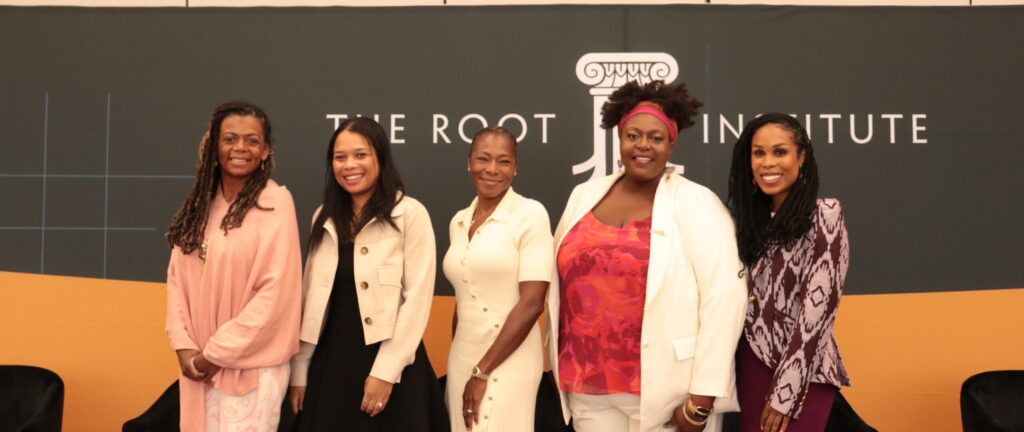
Tackling The Black Maternal Health Crisis
By Sabrina McCrear
The third master class addressed the stigma surrounding the reproductive health crisis among Black women, emphasizing that it is not limited to abortion rights.
“When you hear reproductive health or reproductive justice, there’s automatically this assumption that they’re talking about abortions,” says Oriaku Njoku, executive director of the National Network of Abortion Funds.
Experts joining Njoku in the discussion included Dr. Myechia Minter-Jordan, the chief executive officer of CareQuest Institute for Oral Health; Dr. Joia Creer-Perry, a policy expert who is founder and president of the National Birth Equity Collaborative; and Dr. Uché Blackstock, an emergency physician who is founder and CEO of Advancing Health Equity.
All four women fight diligently for the reproductive justice of Black women, a term coined by Sister Song, a collective of women of color. The definition of reproductive justice is the human right to maintain bodily autonomy, have children, not have children, and parent the children in safe and sustainable communities.
The experts also cited numerous reports of malpractice, ignorance and negligence concerning Black women’s experience in health care, especially pregnant women.
Reproductive justice is not impacted by class. “Black women with a higher economic status still encounter the same experiences as those in a lower economic tax bracket,” Dr. Minter-Jordan says.
The majority of health issues can be addressed early on during pregnancy. For instance, oral health has the potential to cause severe complications for pregnant women and the health of their babies. “Almost 60% of women during their pregnancy have an oral issue that could impact their baby,” Dr. Minter-Jordan says.
These problems are often exacerbated by inaccessible prenatal care leading “African American women [to] have higher rates of preterm morbidity and mortality,” she adds.
Njoku says health-care providers have a responsibility to deliver the best care to their patients, listen to their concerns and take them seriously.
“We have this collective responsibility right now to show up and show out for our people.”
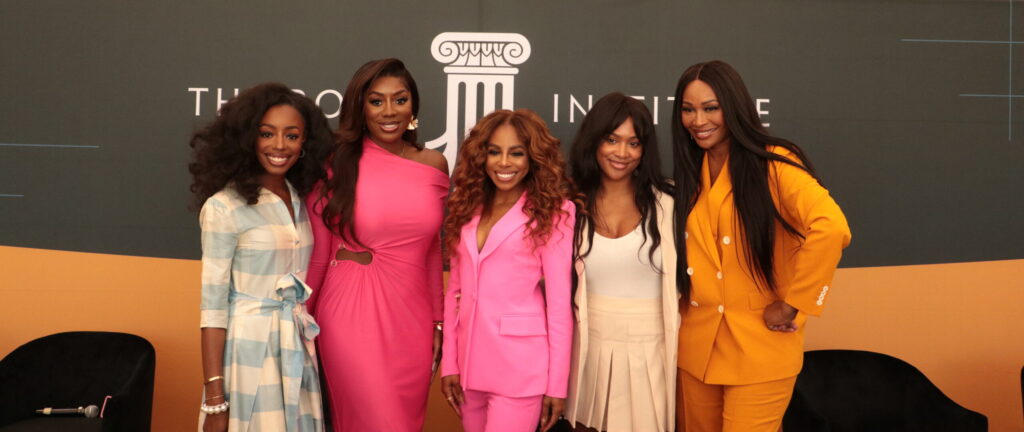
Bravo Stars Share Their Entrepreneurial Success Stories and Urge Black Women to Unapologetically Take up Space
By Madison Pina
Bravo’s most famous Black cast members explored the intersectionality between reality television and entrepreneurship during an entertainment session at The Root Institute.
The panel included Venita Aspen of “Southern Charm,” Jordan Emanuel of “Summer House: Martha’s Vineyard,” Cynthia Bailey of “The Real Housewives of Atlanta” and Wendy Osefo and Candiace Dillard-Bassett of “The Real Housewives of Potomac.” These women have established themselves as change makers and trailblazers in their respective fields including modeling and owning businesses.
The Bravo stars shared what initially drew them to reality TV. “One, I was going to be one of the first Black women on my television show,” Aspen said. “I think the second allure was, I wanted to make sure I was building an audience around that.” Notably, “Southern Charm” welcomed its first cast member of color, Leva Bonaparte, in 2020.
Dillard-Bassett added how she knew she wanted to be a singer, actress, activist and “Jane of all trades.” Reality TV is what she felt could advance who she was and her passions.
While reality TV helped to extend their name and brand, these women were already pioneers in their respective industries. Bailey was an accomplished model, and Osefo was the first Black woman to earn a Ph.D. in public affairs/community development from Rutgers University. Dillard-Bassett was a political journalist, Aspen was a model and influencer, and Emanuel was a model and philanthropist.
When the women decided to expand their brands to reality TV, they were able to use their platforms to launch and foster successful businesses. Bailey shared how during each season of RHOA, she dove into a new business venture. Over her seven-year tenure, she started businesses such as an eyewear line and The Bailey Wine Cellar.
“As women, as entrepreneurs, we all have it in us,” Bailey said. “We’re always super ambitious and optimistic but we still need inspiration.” On days when she lacks inspiration, she turns to her cast mates who help reignite that spark and motivate each other.
This aspect is often overlooked in the reality TV space. Reality TV shows, especially those with an all-Black cast are often thought of as simply messy or unserious. The success of every cast member on these shows often goes unnoticed. Emmanuel, Bailey, Aspen, Osefo and Dillard-Bassett echoed these sentiments and urged people not to put Black women in a box.
“We’re not monolithic,” Osefo said. “We occupy different spaces, and this platform allows you to see all of the spaces that we do occupy.”
TRUTH MATTERS: Veteran journalist Don Lemon offers advice for students in an interview with Alanis Bayulot McNeal for HUNewsService.com before his firesdie chat on the media, Black men and his new life.with Tatsha Robertson, editor-in-chief of TheRoot.com.
.@donlemon in the house @HowardU at #therootinstitute talking about cancel culture, consequence culture, and how we need to be able to have conversations rather than stop listening pic.twitter.com/OdJBuBJgSR
— Chris Evans (@byChrisEvans) September 20, 2023
5 Takeaways on the Plight of Black Women
By Essence Wiley
Dressed in striking colored blazers, suits and trousers, a panel of acclaimed women dropped gems about Black women during a discussion with Sirius XM’s Reecie Colbert. They included former Atlanta Mayor Keisha Lance Bottoms; Crown Act co-founder Orlena Nwokah Blanchard; and Google’s Chief Diversity Officer Melonie D. Parker. Catch what stood out below.
1. It’s OK to Say No.
All three successful women attributed their most audacious act of self-care to saying no. Reflecting on her decision not to run for reelection, Bottoms understood the power of charting her own path. “I knew that if I did run for mayor again, I would very likely win but I also knew that that season had ended,” she said. “For me, self-preservation was doing something that no other person had ever done and putting me first and putting my family first.”
Though a marketing guru, Blanchard expressed similar sentiments. “I assumed and had been conditioned to believe that saying no was selfish and disrespectful,” she said. “I am much more comfortable saying no and being OK with that. And it could be saying no to a job opportunity. You could say no to the way somebody speaks to you or approaches you.”
Parker has taken a similar approach in the C-suite. “Particularly as Black women, everybody wants something from us,” she said. “Everybody. You have to say no.”
2. Hard Work Is Half the Battle.
As a first-generation college student and corporate worker, Parker says she had always assumed hard work was the key to success. “It was actually a white woman who pulled me aside one holiday season, and she said ‘I know you work really hard, but you don’t network hard,’” Parker recalled. “It’s about having conversations and deepening relationship[s] and it’s not just about work. Give people an opportunity to know who you are.”
3. Authenticity Is Acceptable in the Workplace.
Black women are often charged with choosing between being themselves and being successful in the office. Whether it be in code-switching, biting your tongue on specific topics or even wearing your hair a certain way, it’s no secret that black women have to be hyper-aware of how they are perceived. “You have to allow people the beauty of knowing who you are and be genuine about how you like to spend your time, where are the places you like to go, to your own level of comfort,” Parker said.
4. We Are Under Attack.
Blanchard, who works closely with both activists on the ground and large corporations, emphasized that Black women are “under attack.” Amid the day-to-day challenges of blackness and womanhood, they are finding that to “overturn, rewrite, [and] restructure infrastructure that’s 400 years deep is really difficult.”
“While there was an appetite in 2020 to do something different, I believe that appetite is still there but fatigue is setting in,” Blanchard said. “I think that we have to be really intentional and I think we have to be nothing less than aggressive about making sure that fatigue doesn’t set in to the point that we return to what sort of the standards were beforehand.”
5. Sisterhood Is Key Among Black Women.
All three panelists agreed it’s pertinent that Black women uplift other Black women. “I may think that these women are incredible, which you are,” Bottoms said. “But did I say that to you today?”
Tips to Building Economic Equity Through Entrepreneurship
By Aiyana Fewell
The session on “Building Your Platform in the Black Community,” which attracted a diverse audience, offered not only encouraging but also realistic views of entrepreneurship, economic equity and camaraderie. Spectators left with both motivational and tangible advice on how to navigate their respective niches and turn their passions into capital.
This conversation served as a call to action for economic empowerment within the Black community and offered insight for anyone seeking to test the waters of entrepreneurship while making a meaningful impact.
“We’re in this really unique moment for entrepreneurship,” said Brandon Andrews, a consultant for the TV show “Shark Tank,” who kicked off the discussion. “The barrier to entry is lower because of the economic potential. If those businesses grow, those businesses hire. If those businesses have community impact, it’s very significant as we think about potentially closing the wealth gap.”
In addition to his work in entertainment, Andrews is the co-founder of Gauge, an AI-driven market research platform, and chairman of the D.C. Commission on National and Community Service. Andrews emphasized the opportunities available now as a means to create a more equitable future for Black people and, specifically, students attending HBCUs.
Nneka Kanu, an attorney and an influencer, known for her blog, “Queen of Sleeves,” revealed the necessary steps towards building a personal brand, and how valuable it is to learn the logistics of being a business owner.
“There’s so much to having your own business that you don’t know until you start,” said Kanu, noting the importance of having programs that “can teach you about issues that could come up and issues that you might deal with as an entrepreneur.”
Kanu added that these programs can also offer “opportunities for students to intern or partner with established brands, to learn from the inside how to create and grow these types of businesses.”
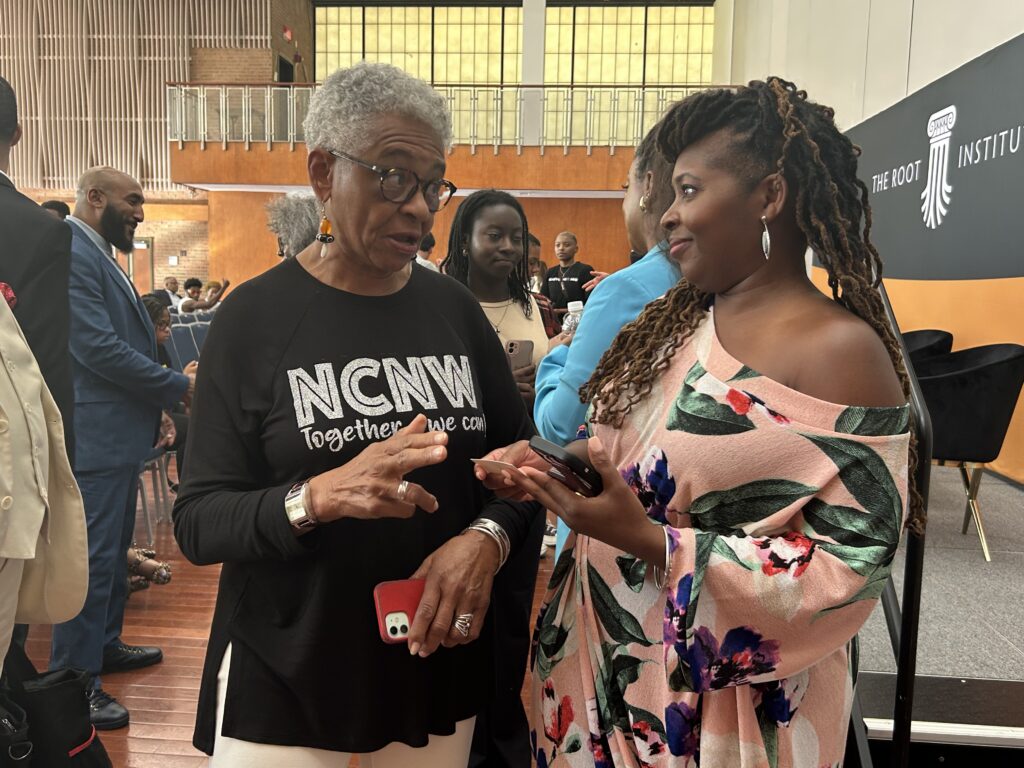
Denene Millner, a New York Times-bestselling author and the host of “A Seat at the Table” talk show and the “Speakeasy With Denene” podcast, showcased the sheer power of content creation and storytelling as tools for entrepreneurs. A longtime journalist, she also partnered with Simon & Schuster to create her own children’s book imprint, Denene Millner Books.
“People put a lot of hard work into their products,” Millner said. “They don’t necessarily know how to put it out into the world and let people know its importance. And from a storyteller, I think it’s really important that they be part of the journey.” Her experiences demonstrated just how important it is not only to do the work, but also to expand one’s reach through the art of marketing.”
Danyel Surrency Jones, head of Amazon’s Black Business and Growth Accelerator and founder and CEO of Powerhandz, brought a unique perspective to the discussion. With her dual role at Amazon and her entrepreneurial endeavors, Jones provided advice on the opportunities and challenges of building a business and the importance of perseverance when trying something new while encouraging others to step into their power.
“I will never forget, during the pandemic, I actually started a business that is sitting on a shelf,” Jones said. “I want you to imagine that HBCUs become the agency of record for all underserved and small businesses.”
“When you think about the power of what you all are creating, it’s history. It’s historical,” she emphasized. “At Howard University, and all the other HBCUs that exist, you have an opportunity to grasp something earlier and innovate quicker, with more speed. So, I need you all to embrace the resources that you have to sit back and think, ‘here are the collective resources that we need’ and truly move this forward.”
Erin Horne McKinney, the event’s moderator, summed up the essence of the panel. “We each have the power to support Black businesses and really change the economic trajectory of our communities,” said McKinney, a veteran executive, investor, advocate for Inclusion, Diversity, Equity and Allyship (IDEA) and executive director of the Howard University & PNC National Center for Entrepreneurship.
“You have to ask yourself every single day, what am I doing? What am I doing to help our Black businesses? Because there are families behind these businesses.”
THE EVOLUTION OF SUCCESS: At The Root Institute Chef Carla Hall discussed stories from the evolution of her personal and professional life to instill lessons she’s learned along the way, from overcoming fear to building confidence and learning the importance of risk-taking. But first, she sat down with Alanis Baluyot McNeal, social media director for HUNewsService.com, to offer a sneak preview and tips for students.
Here at The Root Institute at @HowardU this morning! pic.twitter.com/peS4ojXSME
— Jasper J. Smith (@JasperJSmith_) September 20, 2023
Politics With a Purpose
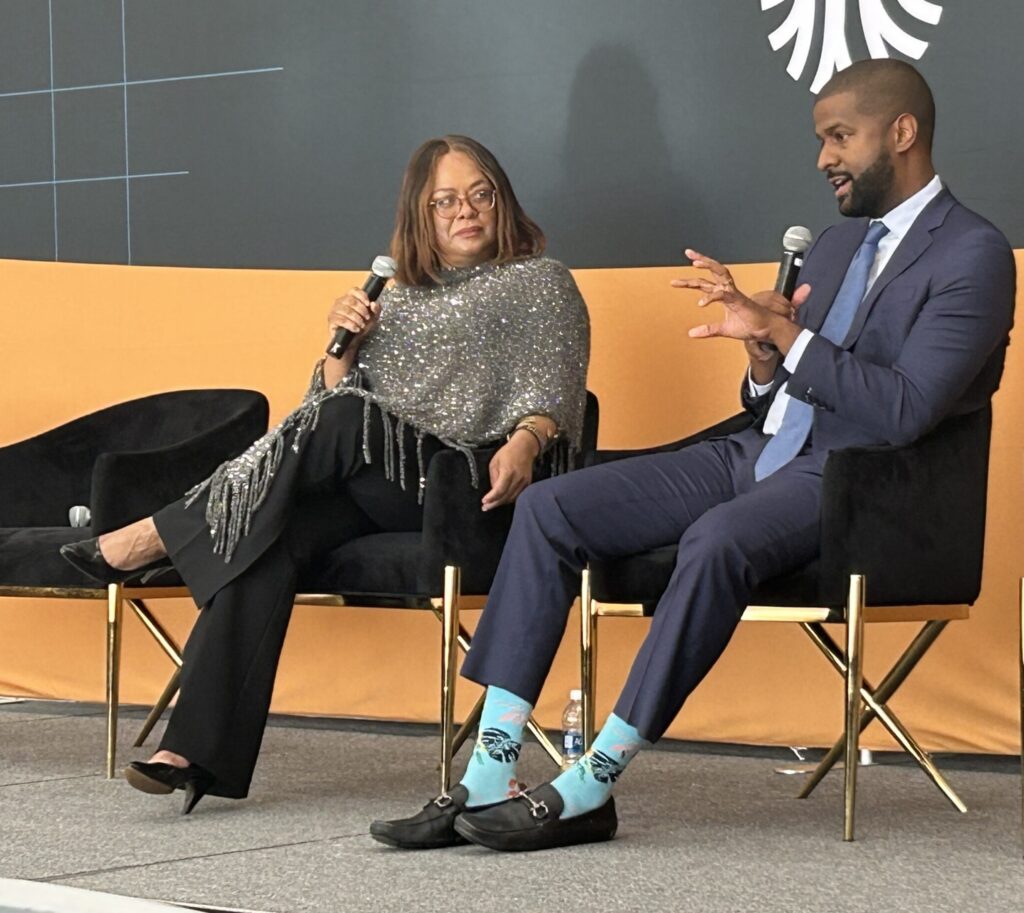
The Root Institute offered a range of sessions to discuss what Democrats are doing to engage Black voters as well as plans to address the concerns of low-income Americans and whether they can live up to the promise of Biden-economics.
Many audience members left enlightened and empowered; others felt that politicians weren’t doing enough to make sure that their voices are heard and concerns addressed. Two women took advantage of the opportunity to speak their minds with Jaime Harrison, chair of Democratic National Committee.
Jasper Smith, editor-in-chief of The Hilltop at Howard University, led a discussion titled “The Future of Democracy” and whether young people think it’s a given. Smith explored the democracy question with David Johns, executive director of the National Black Justice Coalition, and Greg Carr, Ph.D., a professor in the Department of Afro American Studies and the School of Law at Howard.
On a related topic, D.C. insiders discussed “The Power of the Young Black Vote.” They focused special attention on the powerful Black male vote, which experts say is being targeted by Trump, the Republican party, the dark web, Russians and everyone in between.
The panelists included Stephen Benjamin, senior advisor to President Biden; Jotaka Eaddy, founder and CEO of Full Circle Strategies; Antjuan Seawright, CEO of Blueprint Strategy; and Keith Reed, moderator and contributor to TheRoot.com.
The Root Institute closed with a fireside chat between Tatsha Robertson, editor-in-chief of TheRoot.com, and Bakari Sellers, CNN political commentator and best-selling-author. Sellers made history in 2006 when he became the youngest elected official in the United States at the age of 22 by winning a seat in South Carolina’s House of Representatives. He was born into an activist family as the son of Civil Rights leader Cleveland Sellers.
In an era of misinformation and miseducation, Robertson asked Sellers, what role does the media play for Black folk in the coming election and beyond?
POWER OF YOUNG VOTERS: Jaime Harrison, chair of Democratic National Committee, says that every movement has been fueled by young people in an interview with Alanis Bayulot McNeal, social media director for HUNewsService.com.

